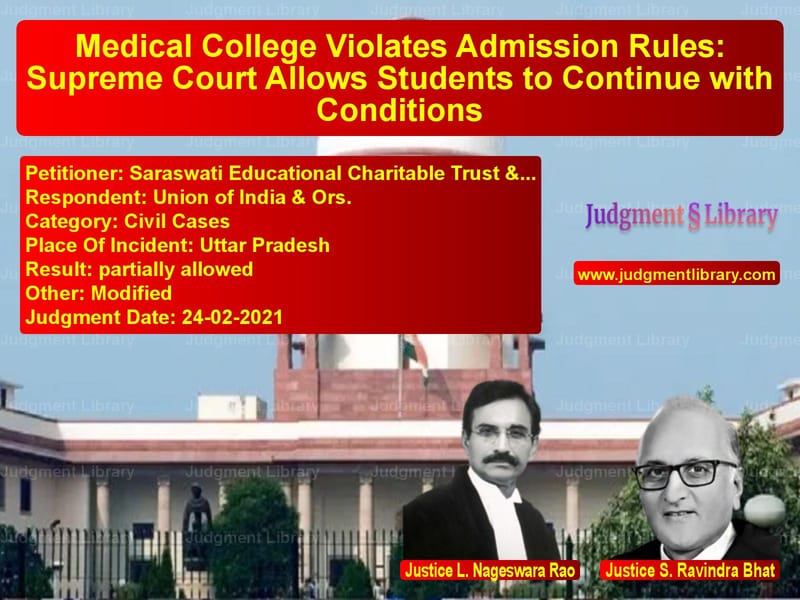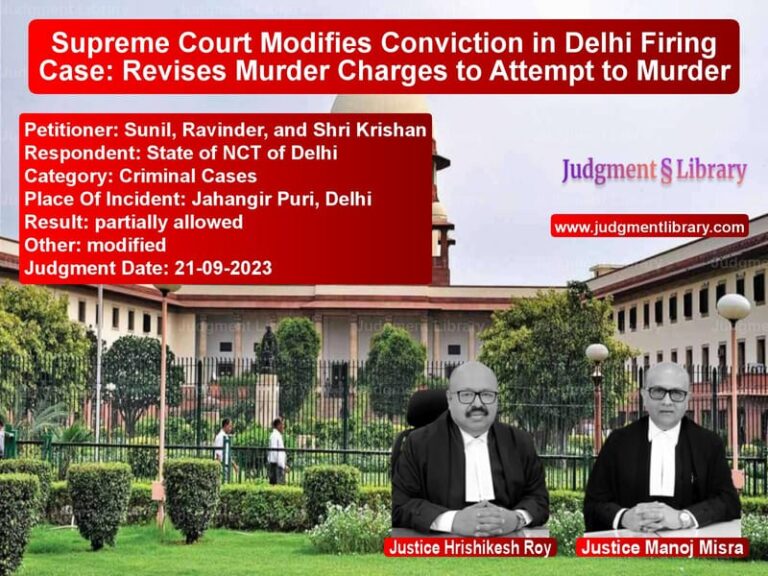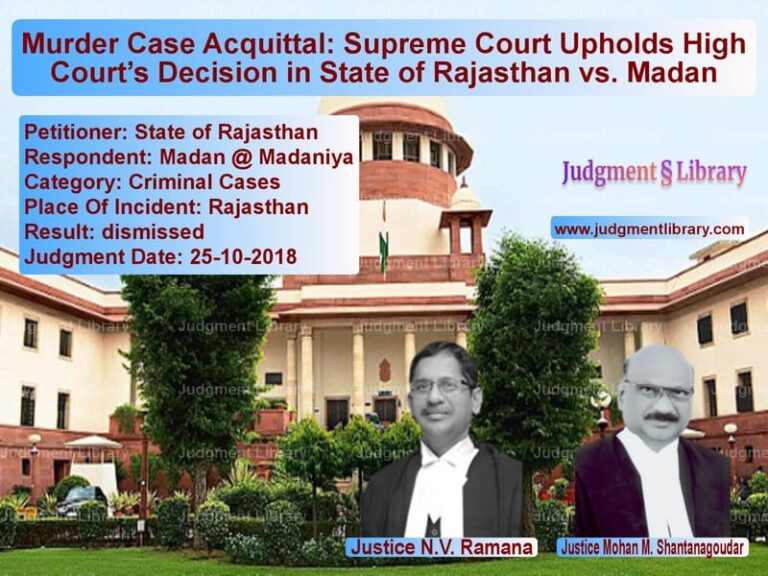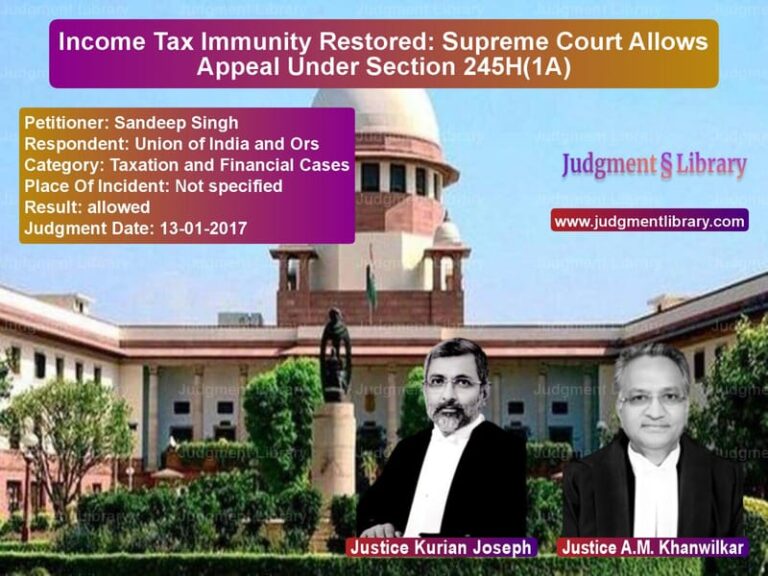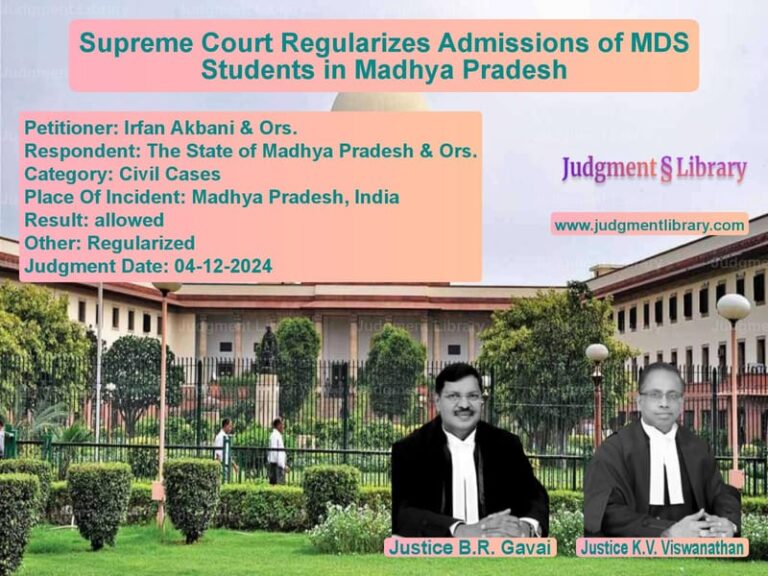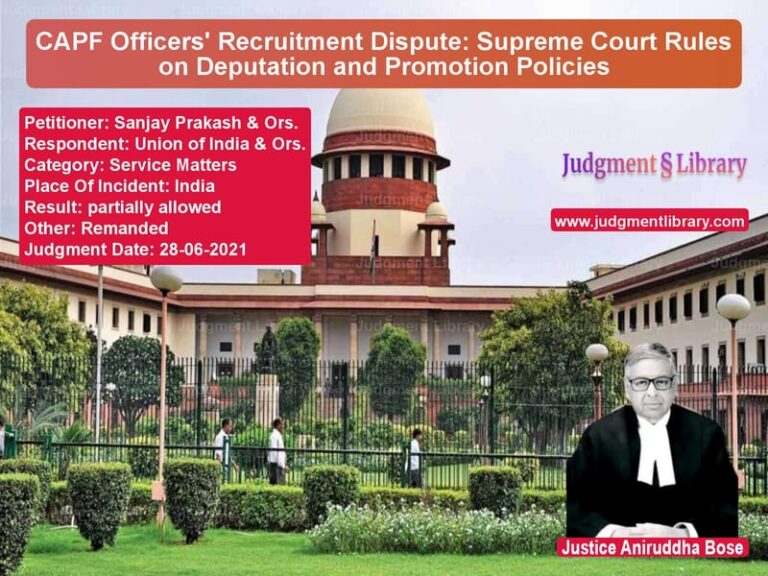Medical College Violates Admission Rules: Supreme Court Allows Students to Continue with Conditions
The Supreme Court of India recently ruled in the case of Saraswati Educational Charitable Trust & Anr. vs. Union of India & Ors., addressing the irregular admission of 132 students into the MBBS course at Saraswati Medical College. The court found that the admissions were made in violation of the Medical Council of India (MCI) regulations but decided to allow the students to continue their studies under strict conditions. This case highlights the importance of following the prescribed procedures for medical admissions and sets a precedent for future violations.
Background of the Case
The dispute arose when Saraswati Medical College, which is run by Saraswati Educational Charitable Trust, admitted 132 students to its MBBS program for the academic year 2017-18 without proper allotment through the centralized counseling process. As per the MCI regulations, medical colleges are required to admit students only through the National Eligibility-cum-Entrance Test (NEET) merit list provided by the state’s Director General of Medical Education (DGME). However, Saraswati Medical College conducted admissions outside this process, leading to intervention by the authorities.
The Medical Council of India (MCI) issued a notice on September 29, 2017, directing the college to discharge the 132 students who had been admitted in violation of regulations. The college, along with the affected students, challenged this order in the Supreme Court.
Petitioner’s (Saraswati Medical College) Arguments
The college and the students raised the following key arguments:
- The college was granted permission to admit students through counseling as per the Supreme Court’s order dated September 1, 2017.
- The college requested a list of students from the DGME on September 1, 2017, but the response was delayed.
- The DGME provided a list of only 150 students on September 5, 2017, and only 18 of them took admission.
- Due to time constraints and to avoid seat wastage, the college admitted students from a list of 735 candidates who had expressed interest.
- The students were admitted based on merit and were unaware of any irregularities in the admission process.
- By the time the issue reached the Supreme Court, the students had already completed two years of their medical education.
Respondent’s (Union of India & Medical Council of India) Arguments
The Union of India and MCI opposed the petition, making the following arguments:
- MCI regulations clearly state that all admissions to MBBS programs must be conducted through centralized counseling based on NEET scores.
- The college had no authority to admit students on its own, even if seats remained vacant.
- Admissions should have been made strictly from the DGME’s list, and if there were vacancies, the college should have approached the Supreme Court for an extension instead of admitting students independently.
- The students were fully aware that their names were not on the official allotment list.
- The college deliberately violated regulations, causing serious implications for the integrity of medical admissions.
Supreme Court’s Observations
The Supreme Court, comprising Justices L. Nageswara Rao and S. Ravindra Bhat, analyzed the case and made the following key observations:
- Regulation 5A of the MCI’s Graduate Medical Education Regulations, 1997 mandates that medical admissions be based on NEET merit and conducted through centralized counseling.
- “The college ought not to have admitted 132 students by conducting a selection on its own without requesting the third respondent (DGME) to send more candidates.”
- “The third respondent (DGME) cannot be blamed for any delay. The college admitted 132 students on its own at 7:30 PM on September 5, 2017, which is highly questionable.”
- The students were not completely innocent as they were aware that they were not on the official allotment list.
- Despite the notice issued by MCI on September 29, 2017, the college did not discharge the students.
- Since the students had completed two years of medical education, canceling their admissions at this stage would cause undue hardship.
Final Judgment
The Supreme Court ruled that the admissions were illegal but allowed the students to continue their medical education under strict conditions:
- The 132 students will be required to perform two years of community service after completing their MBBS.
- The National Medical Commission (NMC) will determine the nature of the community service and its implementation.
- The students will be allowed to take their second-year MBBS exams, and their results will be declared.
- The college was ordered to deposit INR 5 Crores in the Supreme Court registry as a penalty.
- The funds will be used to set up a trust for providing financial assistance to medical students in Uttar Pradesh.
- The college is strictly prohibited from recovering the penalty amount from the students in any way.
The court made it clear that this ruling was an exception due to the peculiar circumstances of the case and should not be treated as a precedent.
Impact of the Judgment
The Supreme Court’s decision has significant implications for medical admissions in India:
- Strict Enforcement of Admission Rules: Medical colleges cannot conduct their own admissions outside the prescribed process.
- Penalties for Non-Compliance: The imposition of a INR 5 Crore fine serves as a deterrent for institutions violating admission regulations.
- Protection of Student Interests: While the admissions were illegal, the court balanced justice by allowing the students to complete their education.
- Community Service Requirement: This sets a precedent for making students contribute to society when admitted through irregular means.
- Future Accountability: The ruling emphasizes that medical institutions must be transparent and accountable in their admission processes.
Conclusion
The Supreme Court’s ruling in Saraswati Educational Charitable Trust vs. Union of India underscores the importance of adherence to medical admission regulations. By penalizing the college while allowing the students to continue their education with a community service obligation, the judgment strikes a balance between upholding the law and preventing undue hardship on students.
For medical institutions, this case serves as a stern warning to follow admission rules diligently. For students, it highlights the need to verify their admission status through proper channels to avoid future legal complications.
Petitioner Name: Saraswati Educational Charitable Trust & Anr..Respondent Name: Union of India & Ors..Judgment By: Justice L. Nageswara Rao, Justice S. Ravindra Bhat.Place Of Incident: Uttar Pradesh.Judgment Date: 24-02-2021.
Don’t miss out on the full details! Download the complete judgment in PDF format below and gain valuable insights instantly!
Download Judgment: saraswati-educationa-vs-union-of-india-&-ors-supreme-court-of-india-judgment-dated-24-02-2021.pdf
Directly Download Judgment: Directly download this Judgment
See all petitions in Education Related Cases
See all petitions in Consumer Rights
See all petitions in Dispute Resolution Mechanisms
See all petitions in Judgment by L. Nageswara Rao
See all petitions in Judgment by S Ravindra Bhat
See all petitions in partially allowed
See all petitions in Modified
See all petitions in supreme court of India judgments February 2021
See all petitions in 2021 judgments
See all posts in Civil Cases Category
See all allowed petitions in Civil Cases Category
See all Dismissed petitions in Civil Cases Category
See all partially allowed petitions in Civil Cases Category

